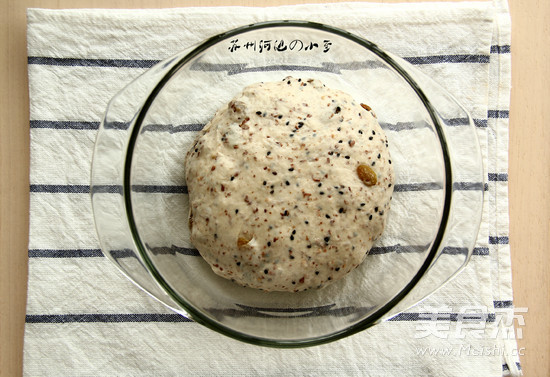Whole Wheat Black Sesame Buns
1.
Knead the dough: first simply knead the water, flour, and yeast into a dough and let it stand for 20-30 minutes. Add caster sugar and salt and knead until the expansion stage. Add butter and knead well, then add raisins and black sesame seeds and knead well. The effect of standing still enables the flour to absorb water in a balanced manner, not too long, otherwise it will ferment in advance. Stirring the yeast, flour and water in advance can also prevent the yeast from contacting with salt and kill the yeast. The process of kneading will heat up the dough. If the temperature is too hot in summer, the water temperature at room temperature will be higher. Therefore, ice water can be used for kneading. The ideal temperature after the dough is reconciled is 22°C-28°C.


2.
Fermentation: Put the kneaded dough into a container of appropriate size, cover it with plastic wrap, and ferment it to 2-2.5 times its size at 24-27°C. I fermented at room temperature of 26℃ for about 2 hours. The condition of fermentation depends on the room temperature of each company. Room temperature is sufficient. The temperature of fermentation should not be too high. 24℃-27℃ is the best temperature for dough expansion.
3.
Divide, press and exhaust, and proof in the middle: Divide the fermented dough into two parts, press and exhaust separately, fold it into three-folded plastic wrap and let it stand for 15 minutes
4.
Shaping: After proofing, gently press the dough into a rectangle to release larger bubbles. Fold the top two corners of the dough to the middle to form a triangle. Fold the top of the triangle down to the middle to make the middle of the dough fuller. Finally, use your thumb to seal the dough and push the dough away from you to increase the surface tension of the dough. Change the position of the dough up and down, and fold the other half to the middle in the same way. Finally, roll the dough so that the seam is at the bottom, forming a torpedo shape (olive shape)
5.
Final fermentation: the shaped bread is put into the oven together with the baking tray, and then an appropriate amount of hot water is put in the final fermentation. The fermentation time is about 60-90 minutes. Depending on the situation, it can be over if it is twice as large. The hot water can be changed every 30 minutes to make the fermentation environment warm and moist again
6.
Preheat the oven: After the final fermentation, the oven can be energized and preheated to 240°C
7.
Decorate and cut the bag: spray the fermented dough with water mist, sieve the flour, cut the bag according to the favorite pattern, send it into the preheated oven, turn it to 220 ℃ for baking, and bake for 20-30 minutes
8.
Cooling: Place the baked bread on the grill and let it cool for about 2 hours. At this time, the bread will continue to evaporate water, gradually dry out, and the flavor will be more intense. The uncooled bread is sealed in a fresh-keeping bag, which is not advisable. Generally, it takes 2 hours for bread to cool to room temperature. During this process, the moisture inside the bread will continue to evaporate, and it will gradually dry out and the flavor will be more intense. The best temperature for most bread is 27℃. Only when it is lowered to this temperature, the residual heat will not cover the taste of the bread itself.
9.
You can also cut the pattern on the surface into a grid
10.
Let the bread cool thoroughly and slice it again
Tips:
1. The water content of the recipe is relatively large, and the water can be reduced according to the personal choice of flour;
2. The baking time I used is 30 minutes, which is for reference only;
3. The amount of water can be increased or decreased according to the flour you use, I use kite bread flour;
4. Baking does not require slate or steam, which is a relatively simple soft European bun. The crust is not crispy, and the overall bread tastes softer. Less sugar and more raisins add sweetness. Soft Europe can find a balance between hard Europe and soft bags. It has the appearance and heart of soft Europe. It tastes better than hard Europe and healthier than soft bags;
5. Black flour and bread flour can be used for decoration. I use rye flour.